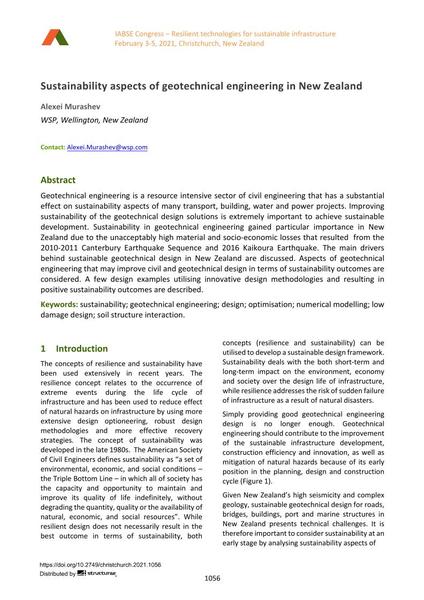Sustainability aspects of geotechnical engineering in New Zealand

|
|
|||||||||||
Bibliographic Details
| Author(s): |
Alexei Murashev
(WSP, Wellington, New Zealand)
|
||||
|---|---|---|---|---|---|
| Medium: | conference paper | ||||
| Language(s): | English | ||||
| Conference: | IABSE Congress: Resilient technologies for sustainable infrastructure, Christchurch, New Zealand, 3-5 February 2021 | ||||
| Published in: | IABSE Congress Christchurch 2020 | ||||
|
|||||
| Page(s): | 1056-1063 | ||||
| Total no. of pages: | 8 | ||||
| DOI: | 10.2749/christchurch.2021.1056 | ||||
| Abstract: |
Geotechnical engineering is a resource intensive sector of civil engineering that has a substantial effect on sustainability aspects of many transport, building, water and power projects. Improving sustainability of the geotechnical design solutions is extremely important to achieve sustainable development. Sustainability in geotechnical engineering gained particular importance in New Zealand due to the unacceptably high material and socio-economic losses that resulted from the 2010-2011 Canterbury Earthquake Sequence and 2016 Kaikoura Earthquake. The main drivers behind sustainable geotechnical design in New Zealand are discussed. Aspects of geotechnical engineering that may improve civil and geotechnical design in terms of sustainability outcomes are considered. A few design examples utilising innovative design methodologies and resulting in positive sustainability outcomes are described. |
||||
| Keywords: |
design sustainability optimisation numerical modeling geotechnical engineering low damage design soil structure interaction
|
||||
